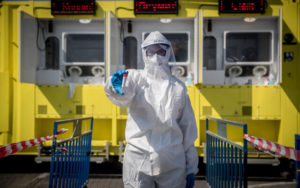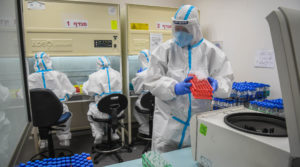FRESH AIR
Second Waves: What can Australia and Israel learn from each other as they both face a new round of Coronavirus?
July 8, 2020 | Jack Gross

On the morning of July 3, Israeli Prime Minister Netanyahu had a phone call with Australian Prime Minister Scott Morrison to discuss dealing with the coronavirus crisis.
In a statement posted late that evening on Netanyahu’s Facebook page, the Israeli PM cited Australia’s example as something he was considering in setting Israeli policy on the pandemic, stating, “Other countries as well, much bigger countries than us, are adopting restrictions. They are also opening and closing. In the US – Texas, Florida and California; in Australia, whose Prime Minister I spoke with this morning, in the state of Victoria, with over 5 million people, they have imposed closures.”
Netanyahu and Morrison would have had a lot to talk about as both countries have entered the second wave of the coronavirus pandemic which medical experts have long warned about.
In the 24 hours to noon on July 7, Australian health authorities reported 199 new infections, mainly in Victoria. This is following two weeks of high double-digit and triple-digit increases in coronavirus cases.
On Tuesday the 7th, the state of Victoria established a six-week lockdown around Metropolitan Melbourne and the closure of the border with New South Wales. The lockdown is being applied to over 5 million people across 10,000 square kilometres. Victorians are also blocked from entering the other states and territories.
Israel has been experiencing an even larger spike in cases.
At the beginning of last week Israel had around 450 new infections a day. On Wednesday July 1, the Health Ministry reported 868 new cases, the largest daily growth since the virus reached Israel in February. By FridayJuly 3, the number had increased to 1,130.
On Monday, July 6 Israel passed 11,000 active cases – this is more than during the pandemic’s first peak in mid-April. During the same period, the number of patients in critical condition increased by 50%.
Eight Israelis have died since Monday, July 6, bringing the death toll to 342.
Both countries were applauded for the way they handled the first wave of COVID-19 from March to early May. During the peak of the first wave on April 2, Israel experienced 738 new cases. By mid-May, Israel was averaging fewer than 30 new cases per day, and many hospital coronavirus wards were shutting down due to a lack of patients.
The peak of Australia’s first wave on March 22 saw 537 new cases. By late May through mid-June, Australia was averaging well under 20 new cases per day.
Yet over the past week, Israel and Australia have had an average of 918 and 132 new cases every day, respectively.
Just months ago, Israel was being praised for its strong COVID-19 policy. Now, the E.U. has labeled Israel a “red country”, due to the high infection rate, and is excluding any Israeli passport holder from entering the E.U.
So what went wrong in both countries and what are they each doing about this latest resurgence? And are there lessons they can learn from each other’s experiences?
What Went Wrong?
Israel’s very strong COVID-19 resurgence can partially be attributed to the government’s premature decision to loosen restrictions fairly rapidly. Around the world a correlation between the reopening of economies and a rise in morbidity have been evident. Having responded to the pandemic more effectively than some of their Western counterparts such as the U.S. and the U.K., Israel began to open the country by early May.
Things appear to have moved too far, too fast, especially with respect to education and mass public gatherings.
Dr. Ran Balicer, chief innovation officer of Clalit, Israel’s largest health-care provider, told the Wall Street Journal, “The last set of openings from an earlier decision to open schools and social life and mass gatherings were probably a step too far… That plus a false sense of safety that people had.”
School classes were initially limited to small groups, but by May 17 all restrictions had been lifted. By the end of May, 224 students and school employees had tested positive, according to the Ministry of Education. Gabi Barbash, former Director-General of Israel’s Health Ministry, told the Times of Israel that “Schools should have either stayed closed or allowed only 15 kids in classes.”
Barbash also claims that authorities unnecessarily permitted the gathering of large crowds in closed spaces. This includes synagogues, event spaces, and other cultural spaces.

A bride walks on the shore of the Mediterranean Sea as she is photographed before her wedding in Ashdod, Israel, on July 6, 2020. (Amir Cohen/Reuters)
Additionally, weddings have been linked to the growth of new hotspots within Israel. More than 2,000 weddings, where thousands from across the country gathered took place between June 15 and June 25.
An anonymous Israeli health official told the Washington Post that “government researchers have traced the bulk of new infections to a single category of activity: public gatherings, particularly weddings.” The official said, “You have people coming from all over the county… They hug each other; they sing, they dance. That’s the ultimate opportunity to infect people.”
According to Barbash, Israel has also “neglected the development of efficient testing.” While Israel has increased testing over the past month, the results take too long to come back and not enough people are being investigated by epidemiologists to trace their contacts. Many of the coronavirus tests in Israel take two to four days to return results and many people are not self-isolating before receiving the results. If one of these individuals turns out to be a carrier then they risk spreading the virus to other healthy people.
There are also criticisms that the Israeli testing regime was too narrow in its criteria for selecting for testing those suspected of being infected.
Israel’s New Restrictions and Countermeasures
“We need to return to restrictive policies in order to flatten the curve,” said Prime Minister Netanyahu last week when he announced capacity limits in closed spaces such as event halls, bars and restaurants.
Just days later, on July 6, the coronavirus cabinet met and approved a new set of restrictions. Effective immediately, all gyms, clubs, bars and cultural shows have been closed and synagogues are limited to a maximum of 19 people. Additionally, the Knesset Law committee has passed a bill that would increase the penalty for not wearing a mask in a public space from 200 shekels to 500.
Among other COVID-19 prevention efforts, the Knesset passed a temporary law on July 1 that restores permission granted the Israeli security service Shin Bet during the first wave to track coronavirus patients using intelligence-gathering technology tied to their cell phones, normally used to track terrorist activity. The Shin Bet will provide the Ministry of Health with the location of any person diagnosed with the virus as well as the location of anyone who has come into contact with the carrier. The law cannot be extended and will expire on July 22.
Since the passing of the law, the Health Ministry has ordered more than 30,000 people into quarantine after the Shin Bet found that these people had been in close proximity to someone who had tested positive for the virus. However, many people claim they were in their homes and away from any contact with outsiders during the times in question and have found it all but impossible to appeal the claims. Thousands of Israelis called the Health Ministry to determine how they may have contracted the virus and crashed the phone system.
Additionally, on Thursday July 2 Defence Minister Benny Gantz approved an order that calls-up 500 IDF reservists to combat the virus. The soldiers will be working in coronavirus quarantine hotels and helping to move carriers from their homes to hospitals and quarantine sites.
Extra restrictions have been implemented in the city of Ashkelon following high growths of infection rates. Yisrael M’salant street in Bnei Brak will also be mandated to quarantine after 60 people from Beit Matityahu Yeshiva tested positive for the virus.

Magen David Adom medical workers perform COVID-19 tests to Arab residents at a mobile testing station for COVID-19, in Jerusalem, July 5, 2020. Photo by Yonatan Sindel/Flash90P
Since May, Israel has increased the amount of testing being conducted and changed testing policies that initially only permitted people experiencing symptoms to get tested. On Tuesday June 30 the Health Ministry had tested the most people to date: 20,540. On Wednesday July 1, 4% of the people who were tested, tested positive, which is considered high.
Israel has also finally launched a widespread antibody test campaign to determine what percentage of the population may be immune to the virus. After over a month of logistical problems within the Health Ministry, antibody testing began at Maccabi and Clailt Health Services, on June 29. The ministry tested 20,000 people on the first day and hopes to test a total of 70,000.
Many public health experts and lawmakers in Israel have proposed randomly screening people for the coronavirus. Right now, mainly people who are experiencing symptoms or have come into contact with someone who recently tested positive are getting tested. It is difficult to determine who is sick and may be asymptomatic. If healthcare professionals are able to test random sections of the public, they could gain a better understanding of what percentage of the population has the virus and what percentage is asymptomatic.
Lessons to be Learned?
There are many lessons Australia can take away from how Israel has handled its re-opening and the second wave of the coronavirus.
First, opening can wait and must be cautious. Above all, mass gatherings such as weddings must only be allowed after careful consideration. While both nations had effective responses to the first wave, it’s imperative that Australia treads carefully to ensure that this second wave is not as bad or worse than their first wave, as seen in Israel today.
The benefits of all of the sacrifices that Israelis have already made may have been diminished as case numbers are soaring and the Netanyahu-led Israeli government struggles with the idea of a full closure.

Technicians carry out a diagnostic test for coronavirus in a lab at Meuhedet Health Services branch in Lod, on July 2, 2020. Photo by Yossi Zeliger/Flash90
Australia should also encourage antibody testing and keep up testing. To contain any further outbreak outside of Victoria, Australian authorities must provide widespread tests.
Epidemiologists must use this information to conduct very effective and quick contact tracing. Australia has also reportedly been struggling on this score – it is clear that it is essential to pour whatever resources are necessary into getting contact tracing right.
Israel has now enlisted the help of the army and the counter-terrorism security agency. While it still remains a question whether the support from the army will help combat the virus, the use of the Shin Bet has already been viewed as highly controversial and misleading in some cases – but if it could be made effective and reliable, it is potentially a powerful tool that would obviate the need for excessive lockdowns. The jury is still out on whether it can reach this level of effectiveness, and reliability is a practical goal.
The biggest take away from Israel is that the response, good or bad, to the first wave does not determine the magnitude of a second wave. Israel implemented one of the earliest and strictest COVID-19 prevention plans, but after much relaxation, is again one of the global hot spots.
Similarly, Australia implemented a strong plan that kept case numbers very low. Australia must continue to take the growth of cases seriously. Israel has become an example of how quickly a few new cases every day, allowed to spread via loosened social distancing restrictions, can snowball into a huge medical problem.
RELATED ARTICLES

‘Optimism’ for Hamas to ‘exile’ their power and create a permanent ceasefire with Israel: Joel Burnie on Sky News

Australian government’s response to Iran-Israel conflict ‘disappointing’: Paul Rubenstein on Sky News

UNRWA feeds the ‘Palestinian delusion’ of no Jewish state: Dr Einat Wilf on Sky News




















